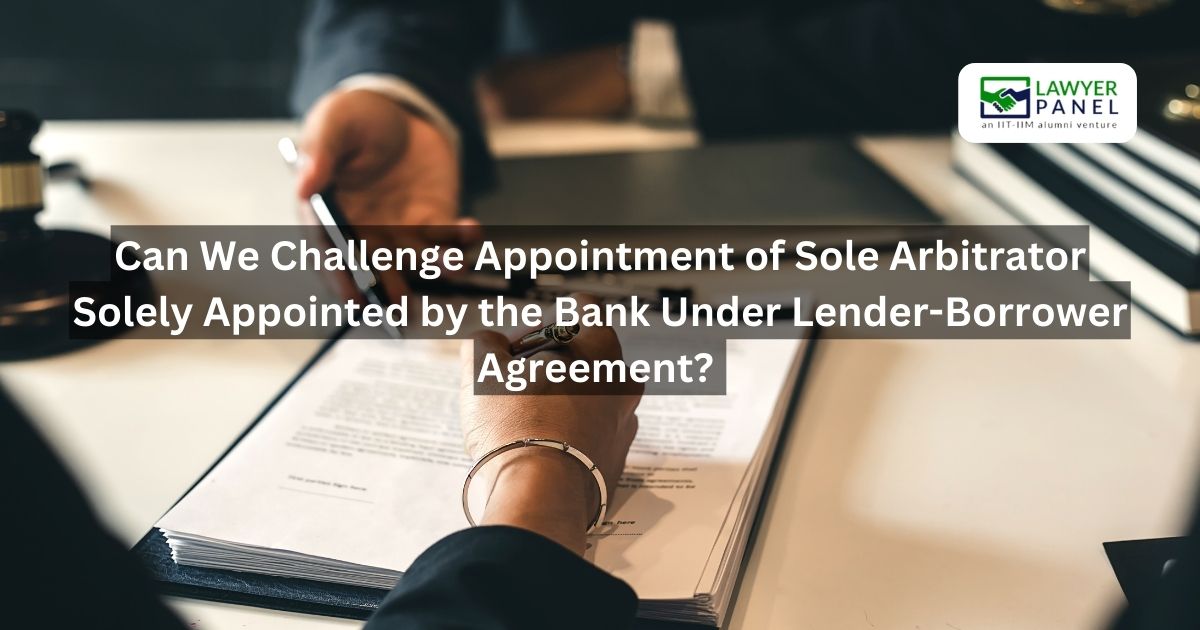Arbitration · 3 min read
How Sole Arbitrators Handle Disputes in Loan Agreements
Lenders are increasingly including clauses in loan agreements that mandate Online Dispute Resolution (ODR) for any disputes arising between them and the borrower. While ODR offers a faster and potentially cheaper alternative to traditional court cases, these clauses often come with a twist: the option of a sole arbitrator chosen by the lender. This raises concerns about fairness and transparency in dispute resolution for borrowers.

Lenders are increasingly including clauses in loan agreements that mandate Online Dispute Resolution (ODR) for any disputes arising between them and the borrower. While ODR offers a faster and potentially cheaper alternative to traditional court cases, these clauses often come with a twist: the option of a sole arbitrator chosen by the lender. This raises concerns about fairness and transparency in dispute resolution for borrowers.
What is Online Dispute Resolution (ODR)?
ODR refers to resolving disputes through online platforms. It can involve mediation, where a neutral third party facilitates communication between the borrower and the lender, or arbitration, where a single arbitrator makes a binding decision, known as an “Award.”
The Attraction of ODR for Lenders
For banks, ODR offers several advantages. It can be faster due to a shortened dispute resolution period and is often less expensive than litigation, streamlining the entire process. Additionally, online platforms enable the efficient handling of a high volume of cases.
The Sole Arbitrator Clause: A Cause for Concern
However, a worrying trend is the inclusion of clauses allowing the bank to choose the sole arbitrator in an ODR proceeding. This raises concerns about potential bias, as the chosen arbitrator might favor the lender, with whom they may have a pre-existing relationship.
Consequences for Borrowers
Borrowers might feel pressured to accept the lender’s choice of arbitrator.
Borrowers often have only 10 days to respond or object (some lenders don’t even offer the option to raise objections, which is unfair).
If the borrower doesn’t respond, the lender assumes they agree.
The lender decides where the arbitration will take place, which could be inconvenient for the borrower.
The arbitration decision is final, with no option for further challenge.
What Borrowers Can Do
Seeking help from experienced advocates can help borrowers understand and navigate these issues. We have skilled lawyers with a strong track record of securing fair outcomes for borrowers. They are dedicated to protecting borrowers from harassment during recovery efforts and providing robust representation before arbitrators.
Conclusion
While Online Dispute Resolution (ODR) offers an efficient and cost-effective means of resolving loan disputes, the process can favor lenders when a sole arbitrator is appointed by them. This creates a potential imbalance, putting borrowers at risk of unjust outcomes. To safeguard their rights and secure fair resolutions, it is crucial for borrowers to seek guidance from experienced advocates. With expert legal support, borrowers can better protect their interests, prevent harassment, and ensure an equitable outcome during arbitration proceedings.



